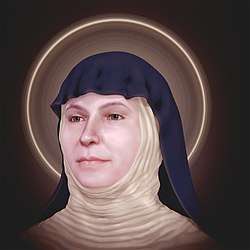Zdislava Berka
Zdislava Berka T.O.S.D. (also, Zdislava of Lemberk; c. 1220–1252[1]) was the wife of Havel of Markvartice, Duke of Lemberk, and is a Czech saint of the Roman Catholic Church. She was a particularly austere and generous woman who founded a convent.
St. Zdislava of Lemberk, T.O.S.D. | |
|---|---|
 Saint Zdislava digital forensic reconstruction, 2018 | |
| Lay Dominican, Foundress, Mother, and Wife | |
| Born | c. 1220 Křižanov, Moravia |
| Died | 1252 Lemberk Castle, Bohemia |
| Venerated in | Roman Catholic Church |
| Beatified | 28 August 1907 by Pope Pius X |
| Canonized | 21 May 1995, Olomouc, Czech Republic by Pope John Paul II |
| Feast | January 4 |
| Attributes | Depicted as a Dominican tertiary with a crucifix wound around with roses; lying in the place of a sick person in bed |
| Patronage | Difficult marriages; people ridiculed for their piety |
Life
Zdislava was from a Moravian family, born in Křižanov, in what is now the Žďár nad Sázavou District of the Czech Republic. She was reportedly an unusually devout child, who at age seven ran away into the forest with the intention of living a hermit's life of prayer and solitude. She was forcibly returned by her family, and made to live a normal childhood from that point on. Later, her family arranged for her to marry Bohemian lord Havel of Markvartice (also known as Gallus of Lämberg or Havel of Lemberk) from prosperous Marquards family, founder of the towns of Jablonné (German: Deutsch Gabel) and Habelschwerdt (now Bystrzyca Kłodzka). Together they would have four children.
As a married woman, Zdislava continued to live a life of remarkable personal austerity, worked tirelessly in the care of the poor and dispossessed, and was, unusually for her era, a frequent recipient of the Eucharist. Tatar invasions of Central Europe (1240–42) were causing large numbers of people to leave their homes during this period, and a large number of refugees sought refuge at the Lemberk Castle in northern Bohemia, where Zdislava lived with her family and assisted these refugees as much as possible.
Her husband was concerned about what he considered the excessive degree of Zdislava's charity to these refugees. In one incident, he is reported to have gone to the bed Zdislava had given to a feverish beggar the night before, but to have found a figure of the crucified Jesus there instead. He is said to have been so impressed by this apparition that he would later allow her to found a Dominican convent in Turnov. Zdislava worked with this convent for the rest of her life, and was eventually buried there.
Several miracles have been attributed to her, including raising from the dead.[2]
Veneration
Shortly after her death Zdislava is reported to have appeared in an apparition to her husband. In 1907, Pope Pius X confirmed her veneration for her native country. She was canonized a saint in 1995 with John Sarkander in a ceremony in Olomouc, Czech Republic, by Pope John Paul II[3]. In artwork, she is commonly depicted as a Dominican tertiary with a crucifix wound around with roses, or lying in the place of a sick person in bed. As a patron saint, she is asked for her intercession in difficult marriages and for people ridiculed for their piety.
References
- Zdislava Berka
- Dominican Friars
- Butler, Alban; Burns, Paul (1995). Butler's Lives of the Saints. A&C Black. p. 10. ISBN 978-0-86012-250-0.
- Burns, Paul (1995). Butler's Lives of the Saints: New Full Edition. Collegeville, MN: The Liturgical Press. ISBN 0-8146-2377-8.
- Dolistová, Marie (2009). Paní Zdislava z Lemberka (in Czech, Polish, Upper Sorbian, German, Esperanto, and English). Prague: ŘÁD. ISBN 978-80-86673-15-8.